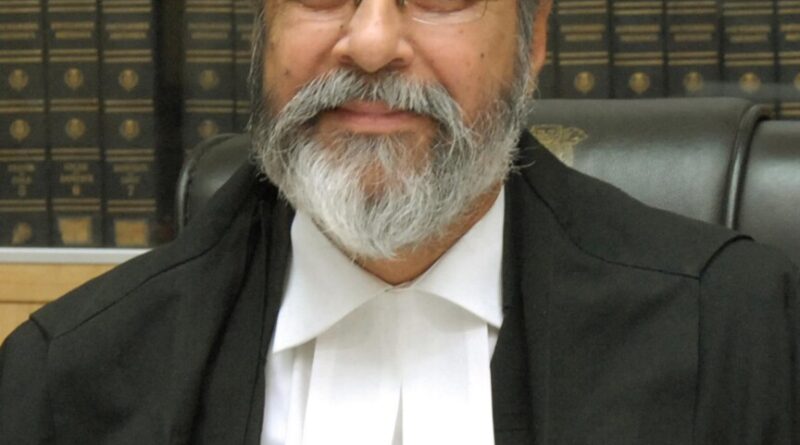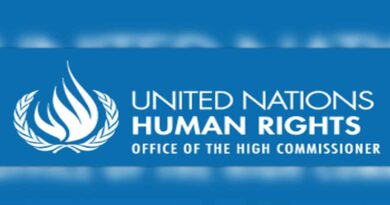Justice Madan Lokur Gets 3 Years Extension as Fiji Supreme Court Judge
(Judicial Quest News Network)
Former judge of Supreme Court of India Madan B Lokur has been re-appointed as a judge of the non-resident panel of the Supreme Court of Fiji.
Fiji President Williame Katonivere wrote to the former Indian Supreme Court judge, stating he has been re-appointed judge of the Fiji Supreme Court for three years, with effect from January 21,2022.
Justice Lokur was first sworn in as judge of the Supreme Court of Fiji in August 2019, which was the first time an Indian Judge got appointed as the judge of the apex court of another country.
The President of the Republic of Fiji, acting upon the recommendation of the Judicial Services Commission and endorsement of the Attorney-General has reappointed Justice Lokur for a term of three (3) years with effect from 21st January 2022.
His appointment is done in pursuance of Chapter 5, Part A, Section 106(2) of the Constitution of the Republic of Fiji ehich states that “the Judges of the Supreme Court are appointment by the president on the recommendation of the Judicial Services Commission following consultation by it with the Attorney-General.
Justice Madan Lokur was born on 31st December 1953. He did his graduation in History (Hons.) from St. Stephen’s College, Delhi University in 1974 and obtained an LL.B. degree from the Faculty of Law, Delhi University in 1977. He enrolled as an Advocate on 28th July 1977 and practised at the Supreme Court of India and the Delhi High Court. He qualified for the AOR examination and enrolled as an Advocate-on-Record in the Supreme Court in 1981. In February 1983 he was appointed as the Editor of Indian Law Review (Delhi Series). He was a Standing Counsel for the Central Government from 1990 to 1996. He was designated as Senior Advocate in February 1997. He was appointed as Additional Solicitor General of India on 14th July 1998.
He was elevated as Judge of the Supreme Court on June 4th 2012 and held office until December 31st 2018. He has been a member of the Mediation & Conciliation Project Committee of the Supreme Court of India since its inception in 2005. He is the Judge in charge of the E-Committee of the Supreme Court of India, to suggest improvements in the working of the Homes and organization under the Juvenile Justice (Care and Protection and Children) Act, 2000 and the Juvenile Justice (Care and Protection of Children) Rules, 2007.
Justice Lokur has authored 159 judgments (as of 14th December 2018, according to Manupatra). He is known for presiding matters of social justice, earning his Bench the “social justice bench” moniker. Over the years, he has authored landmark judgments in various constitutional cases.
Notable Judgments
He was a part of the Bench of the Andhra Pradesh High Court with Justice PV Sanjay Kumar which struck down 4.5% reservation, including access to the prestigious Central Educational Institutions under the Act of 2006, for Muslims and other minorities.
As the Chief Justice of the Andhra Pradesh High Court, Justice Lokur suspended and ordered the prosecution of Special CBI Judge T Pattabhirama Rao who granted bail to G. Janardhana Reddy, who is involved in illegal mining.
He was a part of the Bench along with Justice Deepak Gupta, that asked the Centre to take steps for solid waste management after as vector-borne diseases have been plaguing different parts of the country due to the absence of solid waste management.
In January 2017, he wrote a partly dissenting opinion in Krishna Kumar v State of Bihar. In a 4:3 decision, the SC held that mechanical promulgating of the ordinance without laying it before the Legislature/ Parliament is a fraud on the Constitution. Justice Lokur dissented on this point holding that non-laying of Ordinance before the legislature doesn’t take away the effect of the ordinance. However, he concurred with the majority opinion that an ordinance on its own cannot create irreversible right in the citizen.
He also authored a separate concurring opinion in the Abhiram Singh v Commachen case where he widened the scope of Section 123(3) of the Representation of Peoples Act to hold that politicians addressing the electorates on religion, caste, language will qualify as corrupt practices leading to their disqualification.



